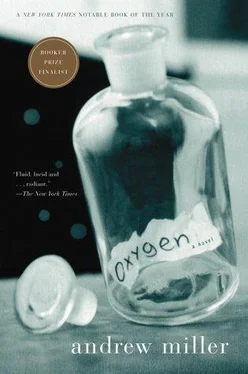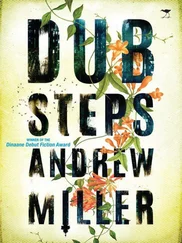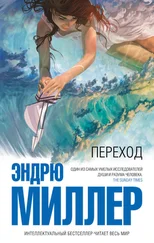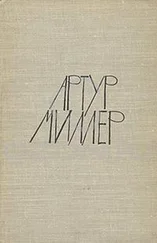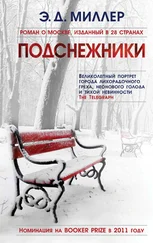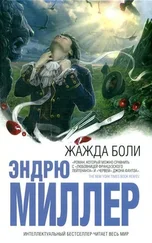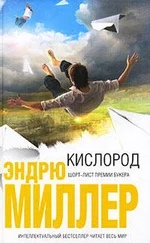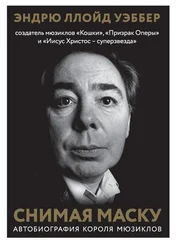Someone tried the door again. ‘Later!’ called Larry. He was busy with the contents of his wash bag, turning them out on to the narrow steel shelf by the basin. Safety razor, multivitamins, deodorant, painkillers. Two spare canisters for Ella’s inhaler. A smoke-brown plastic bottle of Deroxat; five foil sheets of Xanax; a bottle of Luvox, a box of Paxil, a condom, nail-clippers, toothbrush, eye-drops, tweezers. He swallowed a Xanax and a Deroxat, and cleaned his teeth, then blew his nose, noting that his snot was streaked with blood from a last big line of adulterated powder woofed up from a CD cover in the spare room while Kirsty and Ella had waited outside in the Cherokee.
The blue-and-red capsules he had taken from Ranch’s cabinet were in a vinyl side pocket of the wash bag, still wrapped in the same sheet of tangerine toilet paper. He had not looked at them since that afternoon in the Valley, though he had often brooded on them, their nearness inspiring dark and melodramatic thoughts. There were three of them – one slightly larger than the other two. Sex and death. Or nothing at all, nothing but a crooked doctor’s invention, or some story dreamed up by Ranch to amuse the girls, so that even now he was down there in the annexe with Rosinne and Jo-babe, laughing at how the soap-opera guy had fallen for his spiel. Shoulda seen his eyes pop! Man, he just wanted to eat them right there!
Yet something in the sheer improbability, the fantasticalness of it all, suggested to Larry that the pills were precisely what Ranch had said they were, and that somewhere in Las Vegas there was a man with the necessary lethal knowledge to prepare them. But whatever the truth of it, this was the perfect occasion to be rid of them, right now, as they flew over one of those dwindling zones of the planet nobody pretended to own. Yet even as he imagined them spilling almost weightlessly from some duct in the plane’s gleaming underbelly, he was watching his hands carefully wrap them again and return them to their pocket in the wash bag. They were an asset he was not yet prepared to relinquish. Soon, of course, very soon. But not yet.
Going back to his seat, he watched the film continue its run on a score of angled screens. There were bonnets and carriages, and English hills of surpassing loveliness. The gentlemen frowned at each other and bowed, while the ladies waited for secret notes to be passed.
Ella, her colouring book on her lap, her crayon held in the tenseless curl of her fingers, looked as though sleep had caught her very suddenly. Sister Kim smiled and nodded. Larry thanked her. Her smile widened.
‘I know what you are,’ she whispered. ‘At convent we have television too, sometimes.’
‘Will you say a prayer when we land?’ asked Larry.
She said that she would. ‘Jesus is pilot,’ she said.
He laid a blanket over his daughter’s legs and reclined his seat. He was tired again, physically sluggish, but agitated by what seemed like a great backlog of thinking. He could not decide whether there were a great many decisions to be made, or none at all; whether his situation warranted some explosion of energy, some drama of action, or if he should simply wait and see; if indeed there was nothing he could do that would make the slightest difference. He could not save Alice – what manner of angel could? It seemed unlikely he could save his own marriage. And if that should fail, he did not, in all honesty, know if he would have the mettle, the knowhow, to save himself.
He took the earplugs from their bag and sealed off his skull from the sighs and little disgruntlements of his fellow passengers. He closed his eyes and made an effort to focus on transience, but it was too harsh a lesson. He was a child still, and like everyone else, with the possible exception of Mr Endo, he was swimming against the current and would be swept away. At the back of this was the spectre of an overwhelming loneliness, of a place where nobody would stay with you because nobody could. And this was what he was supposed to accept? Where was the comfort in it? What kind of courage did this letting go require? Clearly more than he had to offer. He would have to rely on quite different weapons – weakness for example – and, as he fell, not into sleep but into some parallel condition unique to the long-haul passenger, he began to imagine, and even to believe, despite the fact that in such a dearth of good air one could not entirely trust such ideas, that the last good road left open to him was failure itself. And this he decided to call hope.
The discussion in the little room lasted for over an hour. The window was closed – indeed, it looked to be sealed – and it was not long before they started to sweat and grow irritable. Emil, his beard shaved to the contour of his jaw, delivered a concise though thoroughly partisan analysis of Balkan politics, while the young woman, with her narrow skull, her high cheekbones, her face sloping back to the eyes, where the skin was slightly puffy and discoloured as if she were not quite well, a chronic insomniac perhaps, confined herself to asides about the international conspiracy of indifference that ignored those disasters it found unprofitable to address: the ‘no oil’ argument. László played devil’s advocate. When Emil asserted that the Albanian people, in the guise of the ancient Illyrians, had been the true first inhabitants of Kosovo, he pointed out that there was no real evidence for this, no monuments or reliable texts, nothing but a few fragile linguistic coincidences. Was it not the case that the independence movement in Kosovo was another scheme for the old ambition of a Greater Albania? And what of the legality of it? Why should the Serbs give it away?
‘You defend Miloševi?’ asked the young woman. She could barely keep her seat.
‘Milošević,’ said László, ‘is a cynical and dangerous man. In fact I believe he is mentally ill. But is this about Milošević? It feels like a tribal matter. A blood feud.’
He thought she might slap him for this, but Emil laid a hand on her arm and switched the talk to Bosnia. He spoke of the massacre at Srebrenica, the camps at Omarska and Manjaca, of killers like Arkan and Mirko Jović, and the systematic rape of women and girls by men who masked their faces because they were neighbours.
‘This will happen in Kosovo too,’ he said. ‘Trust me. It will all happen again. At least the Bosnians had an army of sorts. They could fight back.’
‘And you have exhausted all peaceful means?’ asked László. He glanced at the young woman, from whose slender limbs there seemed to emanate a convincing shimmer of violence. ‘Ibrahim Rugova seems a genuinely good man.’
‘Rugova is a good man,’ said Emil, ‘but he is not a man of action. He could not stop a hundred and fifty thousand Albanians being thrown out of work. Doctors, teachers, all those in state employment. He has not stopped the apartheid in the schools or the suppression of our language. He has not stopped detention and beatings. Did you know, monsieur, that any remark critical of Serbia is considered a “verbal crime” punishable by two months’ imprisonment? Did you know that thousands have been summoned to police stations for what the authorities call “informative talks”, interrogations that last for three days and for which no justification is ever offered? They are making their lists, monsieur, and one day they will use those lists and they will not be interested in talking. You know what the Serbs call the Albanians in Kosovo? “Tourists.” They mean to get rid of us, monsieur, and only when it is too late will the world take notice. Is it not accepted everywhere that a man has the right to fight in defence of his life? His family?’
Читать дальше
